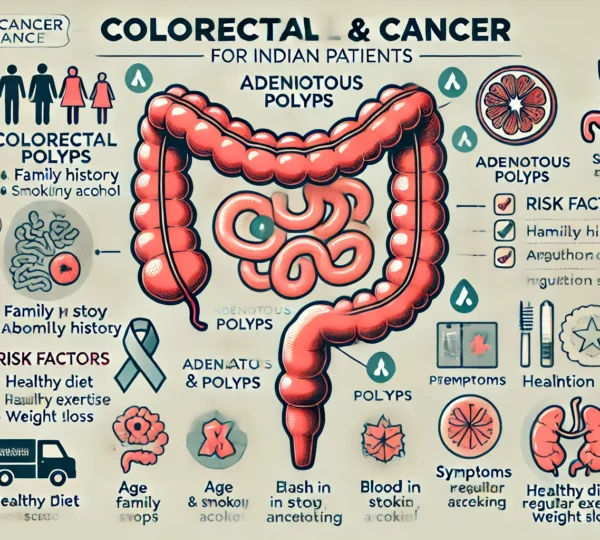The Silent Intruders: Understanding Colorectal Polyps and Cancer for Indian Patients
Introduction:
Colorectal polyps and cancer are becoming more common, especially in India. Understanding these conditions is important for early detection and prevention. This article will explain the basics of colorectal polyps and cancer in a simple and clear way.
What Are Colorectal Polyps and Cancer?
Colorectal polyps are abnormal growths that form in the colon or rectum. While most polyps are noncancerous, some can develop into cancer over time. The most concerning type is adenomatous polyps, which are known to be precursors to colorectal cancer.
Risk Factors for Colorectal Polyps and Cancer
Certain factors increase the likelihood of developing colorectal polyps and cancer. These include:
- Age: The risk increases after the age of 50. It is essential for individuals in this age group to undergo regular screenings.
- Family History: If a close family member has had colorectal cancer or polyps, your risk may be higher. Be sure to share your family history with your healthcare provider.
- Lifestyle Choices: Poor habits, such as a diet high in red meats, low in fiber, sedentary lifestyle, smoking, and excessive alcohol consumption, can increase the risk. On the other hand, making healthier choices can help reduce your risk.
Common Symptoms of Colorectal Polyps and Cancer
In the early stages, colorectal polyps and cancer may not show symptoms. However, as the disease progresses, you may notice:
- Blood in the stool or rectal bleeding
- Changes in bowel habits, like persistent diarrhea or constipation
- Abdominal pain or discomfort
- Unexplained weight loss
- Fatigue or weakness
If you experience any of these symptoms, consult a healthcare provider for a thorough evaluation.
Screening and Early Detection
Regular screenings are key to detecting colorectal cancer early, when treatment is most effective. Colonoscopies are recommended for people over 50 or those with risk factors. Early detection can lead to better outcomes and lower treatment costs.
Ways to Prevent Colorectal Polyps and Cancer
While some risk factors can’t be controlled, there are several steps you can take to reduce your risk:
- Eat a Healthy Diet: Focus on a diet rich in fruits, vegetables, whole grains, and lean proteins. Avoid excessive red or processed meats.
- Exercise Regularly: Stay active to maintain a healthy weight and support overall digestive health.
- Avoid Tobacco and Excess Alcohol: Smoking and drinking too much alcohol increase the risk. Limiting or avoiding these habits can help reduce your risk.
- Regular Screening: Don’t skip your screenings. They are essential for catching potential issues early.
Treatment Options for Colorectal Polyps and Cancer
Treatment for colorectal polyps or cancer depends on how far the disease has progressed. Options include:
- Surgery: Removing polyps or affected parts of the colon or rectum.
- Chemotherapy: Used to kill cancer cells or shrink tumors.
- Radiation Therapy: Used to target cancer cells, especially in advanced stages.
- Combination Treatments: A mix of surgery, chemotherapy, and radiation may be recommended for some patients.
Your healthcare provider will discuss the best treatment plan for your specific condition.
Conclusion: Empowering Indian Patients
Understanding colorectal polyps and cancer is essential for prevention and early detection. Regular screenings, a healthy lifestyle, and early medical attention are critical for reducing the risk of these conditions. By staying informed and proactive, Indian patients can take control of their health and reduce the risk of colorectal cancer.



